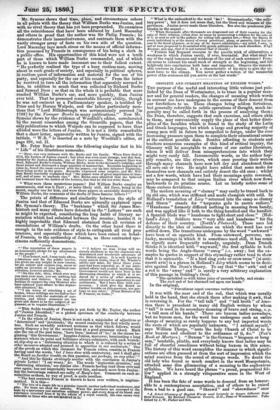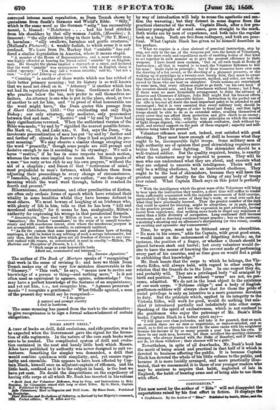OBSOLETE AND CURRENT MEANINGS OF ENGLISH WORDS. • THE purpose of
the useful and interesting little volume just pub- lished by the Dean of Westminster, is to trace in a popular man- ner and for general readers, the changes of meaning which words in current use have undergone in the course of their descent from our forefathers to us. These changes being seldom fortuitous, but generally referrible to subtle operations of thought, much in- genuity may be called forth in the process of analyzing them; the Dean, therefore, suggests that such exercises, and others akin to them, may conveniently supply the place of that better disci- pline of the faculties which is found in the study of the Latin and Greek languages, but which a large and growing majority of young men will in future be compelled to forego, under the ever increasing pressure upon them to complete their Educational course at the earliest possible date. Besides affording to students and teachers numerous examples of this kind of critical inquiry, the Glossary will be acceptable to readers of our earlier literature, whom it will deliver from misapprehensions into which they might very easily fall. Innumerable words, as the author hap- pily remarks, are like rivers, which once pouring their waters through many channels have now left dry and abandoned them all save one or two. He might have added that some make for themselves new channels and entirely desert the old ones ; whilst not a few words which have had their meanings quite reversed, may be compared to that unique Italian river which now flows backwards to its pristine source. Let us briefly notice some of these curious deviations.
The modern meaning of "clumsy" may easily be traced back to iA old one, which was stiffened and made dumpish with cold. In Holland's translation of Livy "returned into the camp so clumsy aid frbzen" stands for " torpentes g.elu in castra rediere." "Handsome " formerly differed nothing in meaning from handy; and was applied like it both to the thing handled and the handler. A Spanish blade was "handsome to fight short and close." (Hol- land's Liry). Soldiers were "very able and handsome" for the defence of their country. (North's Plutarch). These uses led directly to the idea of comeliness on which the word has now settled down. The transitions undergone by the word "awkward" have been of an opposite kind. From untoward, perverse, un- lucky, meanings in which it is sometimes used still, it has come to signify: more frequently unhandy, ungainly. Dean Trench thinks it is identical with wayward,' the first syllable in both words being the Anglo-Saxon " aweg " i.e. away ; but the ex- amples he quotes in support of this etymology rather tend to show that it is untenable. "If a bird sing auke or crow cross" [si ooci- nuerit avis] is a phrase in Holland's Livy which seems to us deci- sive against the Dean's theory. To say that "the 'awk' end of a rod is the 'away' end" is surely a very arbitrary explanation of this passage in Golding's Ovid. "She sprinkled us with bitter juice of uncouth herbs, and strake The awk end of her charmed rod upon our heads."
In the original,
Percutimur (spat converse verbere virgre.
It was with the near end of the rod, that which was usually held in the hand, that she struck them after making it awk, that is reversing it. For the "tall talk" and "tall broth" of Ame- rica there is precedent in many old English writers by whom is used in its secondary meaning of brave and strong, e.g. "a tall man of his hands." • There are buxom ladies nowadays, but no buxom men, for the word has undergone such an entire change of meaning as rarely happens to any but imported words the roots of which are popularly unknown. "I submit myself," says William Thorpe, "unto the holy Church of Christ to be over buxom and obedient to the ordinance of it, &e." (Fox's Book of Martyrs.) "Buxom" is the German " bieg.sam or beug sam," bendable pliable and everybody knows that ladies may be full of cheerful comeliness without being buxom in this sense. The history of this word exemplifies the manner in which signifi- cations are often guessed at from the sort of impression which the mind receives from the sound of strange words. No doubt the
old lady who found so much comfort in the word Mesopotamia, attached some dim glimmering of a meaning to the euphonious syllables. We have heard the phrase "a proud, prognostical fel- low" applied in a strongly vituperative sense in the West of England.
It has been the fate of some words to descend from an honour- able to a contemptuous acceptation, and of others to be raised from a bad to a good one. " Shrewd " and " shrewdness " once * d Select Glossary of English Words used formerly in Senses different from their Present. By Richard Chenevix Trench, D.D., Dean of Westminster. Pub- lished by J. W. Parker and Bon. conveyed intense moral reprobation as Dean Trench shows by quotations from South's Sermons and WicliPs Bible. "Silly,' which is the same word as the German " selig " has successively meant, 1. blessed : "Holofernes . . . . had his head stricken from his shoulders by that silly woman Judith, (Homilies); 2. innocent "the silly children lying in their beds," (Sir T. More); 3. harmless : "silly swallows harmless and gentle creatures,"
'
(Holland's Plutarch); 4. wealt foolish, to whiclr sense it is now confined. We learn from Dr. kay that " amiable " has suf- fered a similar degradation. in. America, where it means stupid. "A member of the House of Representatives, and a most worthy man, WRS highly offended at hearing his friend called 'amiable' by an English- man. He thought the phrase implied a reproach or a sneer, and declared that the word amiable' was synonymous with what in English slang is called spooney." You. may call a woman amiable,' said he, but not a man.' "—Life and Liberty in America.
" Cunning " is another of those words which use has robbed of their better primary meaning ; but its history is so well known that we need not dwell on it. " Attorney " is another which has not had its reputation improved by time. Gentlemen of the law, who practice below the bar, now prefer to call themselves so- licitors. An attorney is one who is put in the place, stead, or turn of another to act for him, and "in proof of what honourable use the word might have," the Dean quotes this passage from A Short Catechism, 1553: "Our everlasting and only High Bishop ; our only attorney, only, mediator, only peacemaker between God and man." " Restive ' and "by and by" have had their significations reversed. When the authorized version of the Bible was made, " by and. by" signified. the nearest possible future. Bee Mark vi., 25, and Luke am., 9. But, says the Dean, "the inveterate procrastination of men has put 'by and by' farther and and farther off; already in Barrow's time it had acquired its pre- sent meaning." We may observe a similar change creeping over the word presently," though some people are still prompt and decisive enough to use it according to its etymology. We call a horse " restive " if he has in some respects too much motion, whereas the term once implied too much rest. Milton speaks of a man "too resty or too rich to say his own. prayers," without the aid of a chaplain ; and. Bacon of that "restiveness of mind," most prejuclimal to men's fortunes, which hinders them from. adjusting their proceedings.to every change of circumstances. "Immobile, lazy, stubborn," says our author, "are the stages of meaning which the word went through, before it reached its fourth and .present."
Hiberniinsms, Americanisms, and other peculiarities of diction, are often only archaic forms of speech which have retained their vitality in some localities whilst they have become defunct in. most others. We must beware of laughing at an Irishman who, with plenty of life in him, tells us that he has been " kilt and murdered entirely," for it seems he has analogically, Milton's authority for expressing his wrongs in that paradoxical formula.
" Assseemr.s.m. Once used by Milton at least, as is now the French asaassiner ' the Italian assassmare,' in the sense of to assault treache- rously and with murderous intent, even where the murderous purpose is not accomplished ; and then secondly, to extremely maltreat.
"'As for the custom, that some parents and guardians have of forcing
marriages, it will be better to sax nothing of such a savage inhumanity, but only thus, that the law which gives not all freedom of divorce to any crea- ture endued with reason, so assassinated, is next in cruelty:—Milton, The Doctrine and Discipline of Divorce, b. i. c. 12.
"'Such usage as your honourable lords
Afford me, assassinated and betrayed:— Id., Samson ilgonistes."
The author of The Book of Martyrs speaks of " recognizing " that work in the sense of revising it ; and. here we think Dean Trench makes one of the very few mistakes discoverable in the "Glossary." "This verb,' he says, "means now to revive our knowledge of a person or thing—and nothing more." Is it not often used as equivalent to agnosco, agnize, acknowledge? One may have a perfect knowledge of the features of an acquaintance, and, yet out him, i. e., not recognize him. " Agnosco procerem" means "I recognize a gentlemen." What Othello agnised, a man of the present day would say he recognised- " I do agnize
A natural and prompt alacrity
I find in hardness.
The same meaning has passed from the verb to the substantive : i to 've recognisance s to sign a formal acknowleament of certain
obligations.

























 Previous page
Previous page